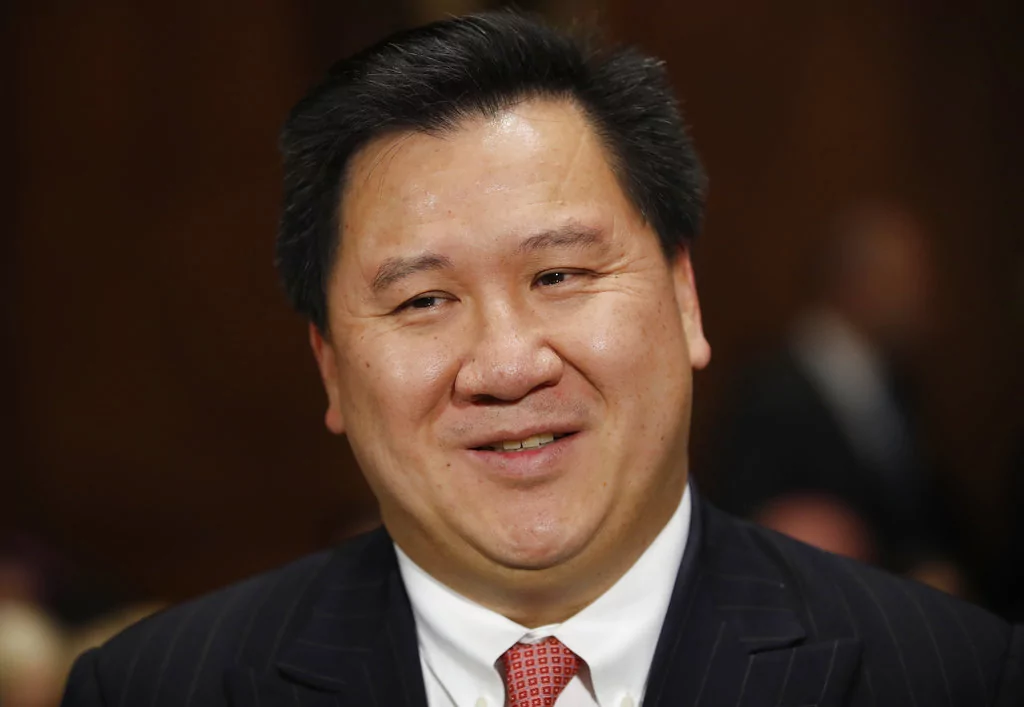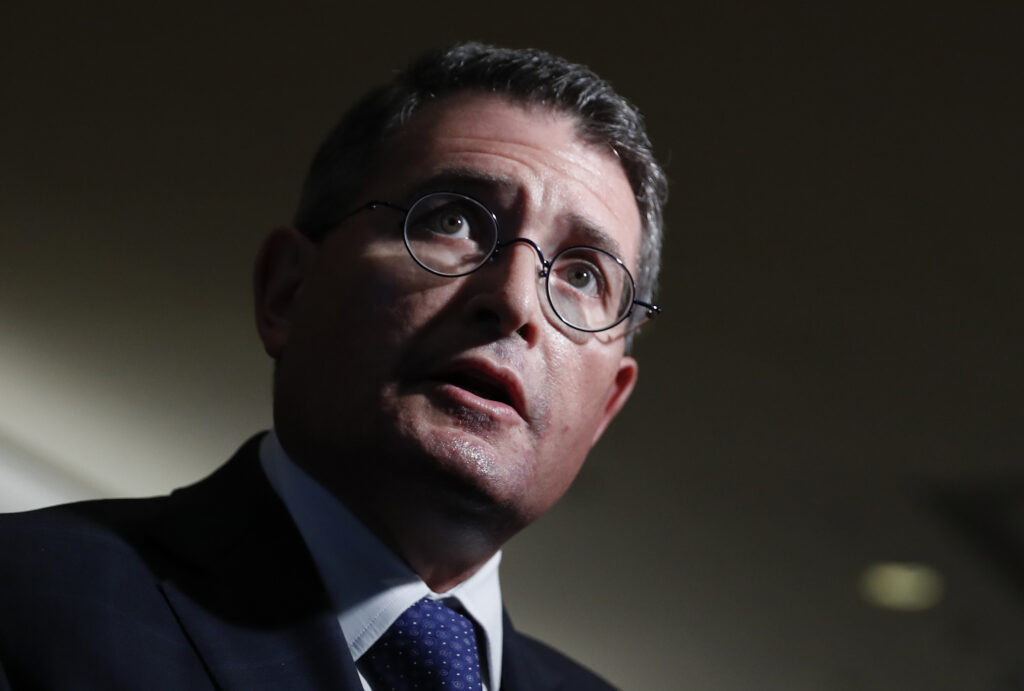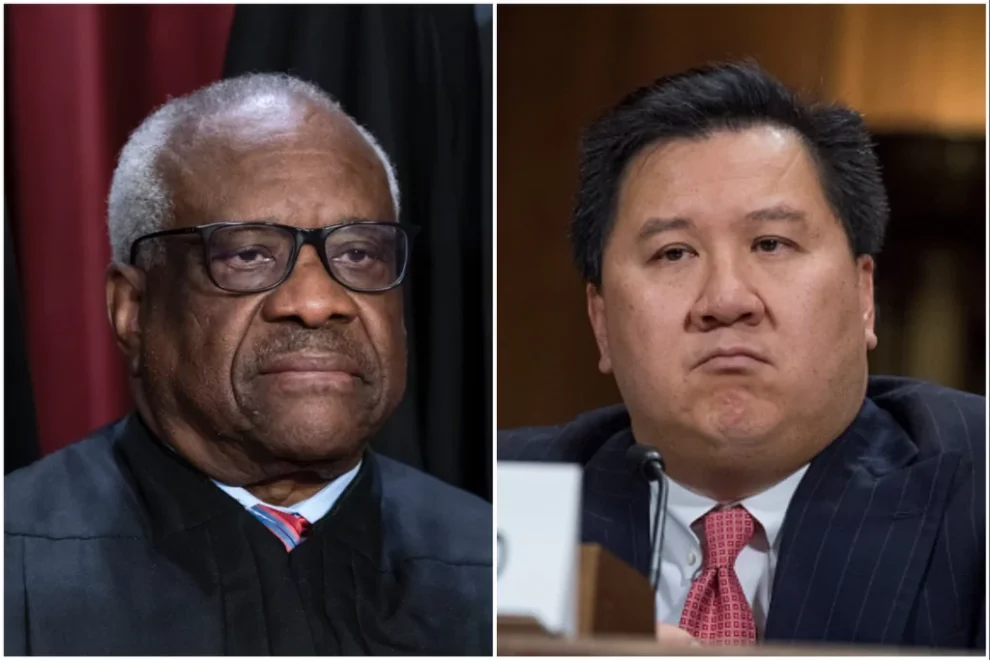The return of President-elect Donald Trump this January has led to speculation that conservative powerhouses of the Supreme Court could be encouraged to retire, allowing Trump to cement a decadeslong legacy on the bench.
While Justices Clarence Thomas and Samuel Alito have shown no indication that they plan to step down, it has nonetheless encouraged court watchers to fantasy book who might be next in line.
James Ho is one such name.
A judge on the U.S. Court of Appeals for the 5th Circuit, Ho has emerged as one of the most influential figures in legal circles and is seen as one of the most likely candidates to be nominated by Trump in the event of a future vacancy.
Ho is widely viewed as a logical heir to Thomas, his former boss, in part for his originalist philosophy and headline-grabbing rulings, law school boycotts, and memorable remarks during oral arguments that have propelled him into the spotlight.

“Of the various judges on the short list, wherever this list is, I think that Judge Ho has some advantages,” South Texas College of Law professor Josh Blackman told the Washington Examiner, noting that there is no guarantee another justice retires under the next Trump administration.
Trump himself acknowledged the importance of allowing justices to enjoy their life tenure to the fullest extent during an interview last week with Time magazine, saying that decisions on retirements are “up to them” when asked whether he thought Thomas or Alito would retire in the next four years.
Speaking through representatives, Alito has signaled his intent to remain on the bench under Trump, and Thomas has likewise given no indication he plans to retire.
But even with no vacancy on the nation’s highest court, that has not stopped legal experts from speculating about the up-and-coming judges who could be ideal picks for Trump if he gets another shot at reshaping the bench.
“If Thomas were to step down, two strong contenders for his seat would be 6th Circuit Judge Amul Thapar, 55, or 5th Circuit Judge James Ho, 51,” wrote David Lat, a lawyer and host of the Original Jurisdiction podcast.
The rise of James Ho

Ho, 51, was born in Taipei, Taiwan before he immigrated to the U.S. in 1976 and became a naturalized citizen. He earned his bachelor’s degree with honors from Stanford University in 1995 and graduated with high honors from the University of Chicago Law School in 1999. In 2004, he married appellate lawyer Allyson Newton, and the couple have two children.
One year later, the firebrand 5th Circuit judge clerked for Thomas during the Supreme Court’s 2005-06 term and has made a name for himself as an outspoken originalist, gaining national attention for his bold opinions. Notably, he would also become the first Asian American justice if confirmed by a majority in the Senate.
Before his confirmation to the 5th Circuit by Trump in 2017, Ho built a distinguished legal career. He served as Texas solicitor general, argued numerous cases before the Supreme Court, and also clerked for 5th Circuit Judge Jerry Smith. Ho’s extensive appellate experience and reputation as a staunch originalist have solidified his standing in conservative legal circles.
Earlier this year, former presidential candidate Vivek Ramaswamy, the current co-leader of Trump’s Department of Government Efficiency, or DOGE, put out a list of ideal judicial nominees for the next conservative president to select, with Ho being among the names.
But even those who champion Ho as a fitting successor to Thomas say the thought is bittersweet.
“I’m not sure anyone can fill Justice Thomas’s shoes,” Blackman said. “He’s truly one of the greatest Americans of all time. His vision on the court over the last 30 years is incomparable, and his influence has not waned in the slightest.”
Trump and Ho may align on issue of birthright citizenship
Ho has notably positioned himself behind novel legal theories on subjects such as birthright citizenship, remarking in informal settings that the 14th Amendment might not guarantee citizenship to children of undocumented immigrants in cases of “invasion,” a word that has been used by officials including Gov. Greg Abbott (R-TX) to describe the immigration crisis at the southern border.
“Birthright citizenship obviously doesn’t apply in case of war or invasion,” Ho told Blackman during a one-on-one interview for Reason last month. “No one to my knowledge has ever argued that the children of invading aliens are entitled to birthright citizenship. And I can’t imagine what the legal argument for that would be.”
While Ho clarified he would not remark on future or pending litigation, his stance offers somewhat of a hint at how he might view the breadth of the 14th Amendment’s citizenship clause in cases surrounding the status of children born from migrants who illegally crossed the U.S. border.
His ‘uncanny ability’ to reorient legal discourse
“Judge Ho has an uncanny ability to shift and reorient legal discourse,” Blackman said, noting the same is true for Thomas.
“For example, no one was talking about the invasion clause until Ho’s opinion,” Blackman said. “He injected it into the conversation on birthright citizenship as well. I call it the ‘Hoverton Window’ — he shifts what people are talking about in the legal world, much like Justice Thomas has done throughout his career.”
Ho also played a key role in shaping the legal environment ahead of the Supreme Court’s decision in Dobbs v. Jackson Women’s Health Organization, the 2022 decision that overturned Roe v. Wade and sent the issue of gestational limits on abortion back to the states to set their own standards and laws.
“Even before Dobbs reached the Supreme Court, Judge Ho wrote a concurrence at the 5th Circuit basically urging the Court to overturn Roe,” Blackman noted. “He set the stage for what eventually happened.”
The Yale boycott and Ho’s 1st Amendment convictions
Ho’s prominence has extended beyond the courtroom. In 2022, he announced a boycott of Yale Law School graduates for clerkships, citing what he described as a lack of tolerance for free speech on campus. “Yale not only tolerates the cancelation of views but actively encourages it,” he said.
The boycott spurred a heated debate about ideological bias in higher education, with many conservatives lauding Ho’s stance as a defense of 1st Amendment principles and critics accusing him of engaging in politics as a jurist. But this move reflected Ho’s broader commitment to challenging perceived liberal orthodoxy both inside and outside the courtroom.
But Ho’s boycotts have not gone without criticism.
Judge Thapar, another contender to succeed Thomas, and Judge Kevin Newsom of the 11th Circuit have expressed concerns regarding Ho’s decision to boycott hiring law clerks from certain law schools due to perceived intolerance of conservative viewpoints. They argue that such actions may unfairly affect students and that there remains an open debate about whether judges should engage in such boycotts.
From the Left, Vox legal analyst Ian Millhiser has critiqued Judge Ho’s judicial philosophy and writing style, describing him as the “edgelord of the federal judiciary” and suggesting that his opinions are crafted to provoke reactions rather than to provide measured legal analysis.
The 5th Circuit’s prominence with the Roberts court
The growing influence of Ho among legal scholars reflects the prominence of 5th Circuit cases that come barreling toward Chief Justice John Roberts’s court. Covering Texas, Louisiana, and Mississippi, the 5th Circuit is a conservative powerhouse, with many of its rulings reviewed, and sometimes upheld, by the Supreme Court.
This term alone, roughly 25% of the cases the Supreme Court has added to its docket stem from the 5th Circuit, and last term included another large quantity of cases from that appeals court. The Supreme Court has only agreed to hear around 55 cases so far this term.
In addition to Ho’s prominence among the judges considered for high court spots, 5th Circuit Judge Andrew Oldham, 45, is another leading candidate, particularly if Alito retires, according to Lat.
A former clerk for Alito, Oldham has a jurisprudence often compared to his mentor’s. His opinion in NetChoice, LLC v. Paxton, which defended Texas’s social media law, underscores his alignment with Alito’s approach to free speech and state sovereignty.
The Supreme Court ultimately vacated Oldham’s decision, with Justice Elena Kagan writing a majority decision criticizing Oldham’s ruling, though Alito wrote a concurrence that was more critical of Kagan’s majority holding.
Trump’s opportunity to solidify his legacy
Trump’s first term from 2017-2021 reshaped the federal judiciary through the appointment of 234 federal judges, including three Supreme Court justices. His appointments solidified a 6-3 conservative supermajority, a transformation that Robert Luther, who worked in the first Trump White House on judicial nominations, described as “turning judges into the political tool that they can be.”
Appointing judges was Trump’s “most successful policy initiative during his first term. He ran on judges in 2016, appointed Justice Scalia’s successor, Justice Gorsuch, with resounding success, and his appellate judges were among the best appointees of his administration,” Luther told the Washington Examiner last month.
The stakes are high. If Thomas, 76, or Alito, 74, retires, Trump could appoint younger conservatives to ensure the Supreme Court’s originalist tilt for decades, much as he did by naming younger Justices Gorsuch, Brett Kavanaugh, and Amy Coney Barrett.
A speculative future
While speculation about vacancies advances into the new year, history suggests caution. Justices often stay longer than expected, with Justice Stephen Breyer retiring at 83 and Justice Ruth Bader Ginsburg serving until her death at 87.

Leonard Leo, a judicial activist who played a central role in the court’s rightward shift and aided Trump in choosing his three nominees, issued a rare statement in November pushing back on the notion of speculating who might become the successors for justices on the bench when no retirement plans have been announced.
“Justices Thomas and Alito have given their lives to our country and our Constitution, and should be treated with more dignity and respect than they are getting from some pundits,” Leo said.
CLICK HERE TO READ MORE FROM THE WASHINGTON EXAMINER
For now, Judges like Ho, Oldham, and Thapar remain part of a larger conservative judicial conversation, not a guarantee of their eventual elevation to the Supreme Court.
But as Trump’s second term commences, the possibility of new appointments will loom large, offering him a chance to further solidify his legacy and shape the Supreme Court for generations.
























